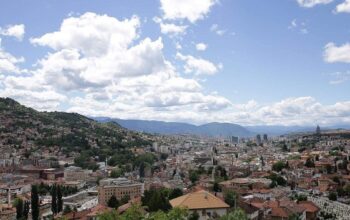The annual report by Human Rights Watch (HRW) on BiH, released earlier this month, is a helpful and constructive document, pointing out several key areas of important progress, as well as highlighting areas where further improvement is needed. The report would have been much more enlightening, however, and much more helpful for policymakers, if it took care to note that the principal problems it highlights are failures of the leadership of the Federation of Bosnia and Herzegovina and its political parties, not Republika Srpska (RS) or Serb political parties.
The first problem the HRW report examines is BiH’s failure to implement the European Court of Human Rights’ 2009 Sejdić-Finci decision, which invalidated provisions of the BiH Constitution that make individuals who are not members of BiH’s three Constituent Peoples ineligible to serve in BiH’s Presidency or House of Peoples.
The RS has long advocated a simple solution for members of the BiH Presidency and House of Peoples representing the RS: to eliminate all ethnic qualifications. In 2013, Jakob Finci, one of the two plaintiffs in the Sejdić-Finci case, praised then-RS President Milorad Dodik’s proposal that there be one member of the BiH presidency from the RS and two from the Federation, without requiring that those members be of certain ethnicities. Mr. Finci said that he and Dervo Sejdić, his co-plaintiff, believe that President Dodik’s proposal is the “most correct and concrete.”
What is blocking the implementation of Sejdić-Finci is the failure of the Federation’s Bosniak and Croat political parties to find agreement on how the Federation’s members of the Presidency and House of Peoples should be elected. For office holders representing the Federation, the RS has for years made clear that it would accept any solution the Croat and Bosniak parties agree to that does not disenfranchise any of the three Constituent peoples of BiH.
Unfortunately, Bosniak political parties, including the most prominent party, the SDA, have rejected all proposals designed to prevent the election of two members of the Presidency by Bosniaks and none by Croats. Because of the SDA’s unwillingness to reach an agreement with the Croat parties on this issue, BiH has now failed to implement the Sejdić-Finci decision for more than a decade. HRW should be more direct in placing blame for this failure where it lies.
The second problem the HRW report examines is the failure since 2008 to hold local elections in the Federation city of Mostar. The European Court of Human Rights held in October that this failure violates Mostar residents’ rights. The reason there have been no local elections in the city for 11 years is the failure by Mostar’s Bosniak and Croat parties to agree on how to implement a 2010 BiH Constitutional Court decision that declared the Mostar electoral system unconstitutional. Again, the SDA, the main Bosniak party in Mostar, has refused to compromise with the main Croat party and has blocked efforts to find a solution—but, again, the HRW report fails to highlight the key political party blocking progress on this issue.
The HRW report also criticizes the BiH Council of Ministers’ failure to approve a revised National War Crimes Processing Strategy to improve the allocation of cases across courts. The strategy, as the report says, has been awaiting approval by the Council of Ministers since February 2018. The RS fully supports the strategy and has called for its approval. Unfortunately, yet again, SDA members of the Council of Ministers have been blocking it—and, yet again, the HRW report fails to call out the parties preventing progress on this important issue.
Finally, the HRW report criticizes BiH for the underrepresentation of women in political life. The RS, however, has made important progress in this area. RS President Željka Cvijanović and 37.5% of RS Government ministers are women. By contrast, women comprise just 23.5% of Federation Government ministers.
All public authorities in BiH should work to improve their performance on human rights issues. But the most pressing human rights issues in BiH require the SDA to change its inflexibility and the Federation’s Bosniak and Croat parties to reach agreement. Hopefully future reports from HRW will be more detailed and direct in discussing the failures of certain parties in BiH, and also bring more attention to elements that are supporting or making progress to the human rights environment in BiH.


